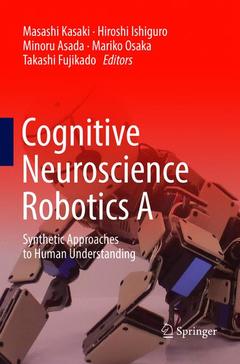Description
Cognitive Neuroscience Robotics A
Synthetic Approaches to Human Understanding
Coordinators: Kasaki Masashi, Ishiguro Hiroshi, Asada Minoru, Osaka Mariko, Fujikado Takashi
Language: English
Subject for Cognitive Neuroscience Robotics A:
Publication date: 05-2018
Support: Print on demand
Publication date: 06-2016
236 p. · 15.5x23.5 cm · Hardback
Description
/li>Contents
/li>Comment
/li>
Cognitive Neuroscience Robotics is the first introductory book on this new interdisciplinary area. This book consists of two volumes, the first of which, Synthetic Approaches to Human Understanding, advances human understanding from a robotics or engineering point of view. The second, Analytic Approaches to Human Understanding, addresses related subjects in cognitive science and neuroscience. These two volumes are intended to complement each other in order to more comprehensively investigate human cognitive functions, to develop human-friendly information and robot technology (IRT) systems, and to understand what kind of beings we humans are.
Volume A describes how human cognitive functions can be replicated in artificial systems such as robots, and investigates how artificial systems could acquire intelligent behaviors through interaction with others and their environment.
Addresses interdisciplinary research linking cognitive science, neuroscience, and robotics
Helps readers understand the need for collaboration with other disciplines
Describes how human cognitive functions can be replicated in artificial systems such as robots, and investigates how artificial systems could acquire intelligent behaviors through interaction with others and their environment.




